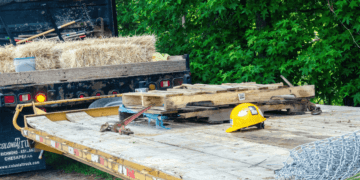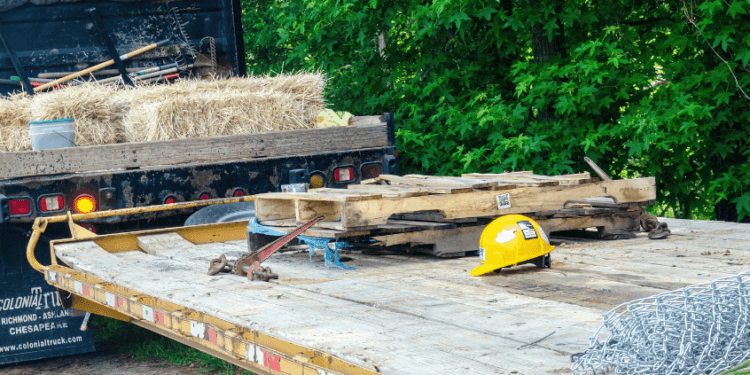Transporting agricultural equipment can be a challenge, especially when dealing with large, heavy, or oddly shaped machinery. Farmers and agricultural businesses need reliable and efficient ways to move equipment from one field to another or across long distances. That’s where flatbed trailers come in. Their open design and versatility make them ideal for transporting everything from tractors to hay bales, streamlining the process of agricultural equipment transport. Let’s explore the benefits of using flatbed trailers and how they help farmers keep their operations running smoothly.
1. Accommodating Large and Heavy Machinery
One of the biggest advantages of flatbed trailers is their ability to handle large, heavy equipment that may not fit in enclosed trailers. Agricultural machinery such as tractors, combines, and plows are often oversized and irregularly shaped, making transportation a logistical challenge. Flatbed trailers offer a wide, open platform that can easily accommodate this type of equipment, allowing farmers to transport it without disassembling or adjusting their machinery.
Because flatbed trailers don’t have walls or a roof, loading and unloading heavy equipment is simpler and more efficient. Equipment can be loaded from any side using forklifts, cranes, or ramps, reducing the time and effort needed to prepare machinery for transport.
2. Versatility for Multiple Types of Equipment
Farming operations require various equipment, from small implements to large harvesters. Flatbed trailers are versatile enough to handle all types of machinery, regardless of their size or shape. Whether it’s a bale wrapper, a grain cart, or a hay baler, a flatbed trailer provides the flexibility needed to transport it all in one go.
In addition to large machinery, flatbed trailers can also carry other farming essentials, such as hay bales, feed, or smaller tools and supplies. This versatility allows farmers to make fewer trips, saving both time and fuel costs.
3. Easier Loading and Unloading
Agricultural equipment can be cumbersome to load and unload, especially when dealing with tight spaces. Flatbed trailers eliminate this issue by providing an open platform with no restrictive walls. This makes it much easier to load and unload equipment, even in difficult or uneven terrain, which is common on farms.
Flatbed trailers can also be equipped with ramps or lifts, making driving machinery directly onto the trailer simple. This is particularly useful when transporting equipment like tractors or ATVs, which can be driven on and off without the need for extra loading equipment.
4. Handling Irregularly Shaped Loads
Not all agricultural loads are easy to transport. Some equipment, like irrigation systems or large implements, may have irregular shapes that make traditional trailers impractical. With their open and spacious design, flatbed trailers can easily handle these loads.
Farmers can use straps, chains, or other securing mechanisms to keep irregularly shaped equipment in place, ensuring it stays secure during transport. The open design also allows for more flexibility in terms of how equipment is positioned, which is particularly useful when dealing with oversized loads.
5. Long-Distance Equipment Transport
Transporting equipment over long distances can be challenging for farms spread across large areas or multiple locations. Flatbed trailers offer a reliable solution, allowing farmers to move their equipment quickly and efficiently from one location to another.
Whether you’re moving machinery from one field to another or transporting equipment across state lines, flatbed trailers provide the durability and capacity needed for long-haul trips. Their open design makes them easy to load at one site and unload at the next, cutting down on the time spent preparing equipment for the road.
6. Cost-Effective and Time-Saving
Efficiency is key for any farming operation, and flatbed trailers help save both time and money. Instead of hiring expensive transportation services, farmers can use flatbed trailers to move their equipment themselves, reducing the cost of equipment transport. Additionally, by loading multiple pieces of machinery at once, farmers can reduce the number of trips required to move equipment, further reducing fuel and labor costs.
The ease of loading and unloading also saves time, allowing farmers to return to work quickly. With fewer logistical challenges, they can focus on their core farming tasks instead of worrying about how to move equipment.
Conclusion
Flatbed trailers are an essential tool for modern farmers who need to transport large, heavy, or irregularly shaped agricultural equipment. Their open design, versatility, and ease of use make them the go-to choice for farmers looking to streamline their operations and keep their equipment on the move. Whether you’re transporting a tractor across the field or moving a load of hay bales to market, flatbed trailers offer the durability and flexibility needed to get the job done efficiently. Investing in a flatbed trailer can be a game-changer for your equipment transport needs if you’re in the agriculture business.























































